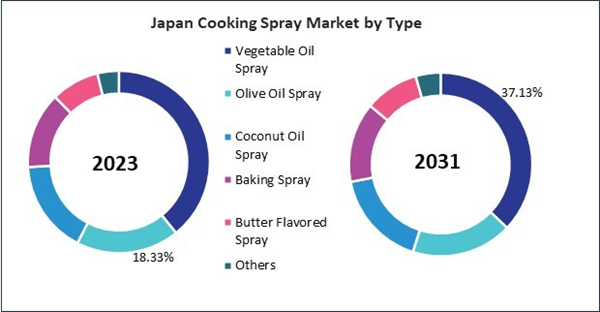The China market dominated the Asia Pacific Cooking Spray Market by Country in 2023, and would continue to be a dominant market till 2031; thereby, achieving a market value of$1.09 billion by 2031. The Japan market is registering a CAGR of 5% during (2024 - 2031). Additionally, The India market would showcase a CAGR of 6.5% during (2024 - 2031).
The market for cooking sprays is also influenced by changing consumer preferences and dietary trends. For example, the rise of low-carb and ketogenic diets has increased demand for cooking sprays made with healthy fats such as coconut or avocado. Similarly, the growing popularity of plant-based diets has created a demand for cooking sprays that are free from animal products. In response to these developments, manufacturers have introduced a range of cooking sprays to accommodate various dietary restrictions and preferences.
Despite the many benefits and opportunities in the cooking spray market, some challenges need to be addressed. The perception among consumers that cooking sprays are less natural and healthier than conventional oils is one of the greatest obstacles. Some cooking sprays contain propellants and additives that frequently contribute to this perception, which can raise concerns regarding their health and safety. In an effort to mitigate these concerns, manufacturers are developing cooking sprays that contain natural ingredients and employing transparent labeling practices.
The rapid growth of the food service industry, driven by urbanization and a rising middle class, has led to an increased adoption of cooking sprays. In countries like Japan and South Korea, where culinary precision is highly valued, cooking sprays help chefs achieve the desired outcomes more easily. For example, Japanese tempura restaurants might use cooking sprays to lightly oil surfaces before frying, ensuring the batter adheres properly and the food cooks evenly. Similarly, cafes and bakeries in South Korea use cooking sprays to prepare popular items like bread and pastries, maintaining the right balance of moisture and crispiness. Hence, it is expected that the aforementioned factors will propel the expansion of the market in the coming years.
Based on End Use, the market is segmented into Commercial Use, and Home Use. Based on Distribution Channel, the market is segmented into B2B, and B2C. Based on Type, the market is segmented into Vegetable Oil Spray, Olive Oil Spray, Coconut Oil Spray, Baking Spray, Butter Flavored Spray, and Others. Based on countries, the market is segmented into China, Japan, India, South Korea, Singapore, Malaysia, and Rest of Asia Pacific.
List of Key Companies Profiled
- Pompeian, Inc.
- Bunge Limited
- Conagra Brands, Inc
- The J.M Smucker Company
- B&G Foods, Inc.
- The Hain Celestial Group, Inc.
- Ventura Foods, LLC (Smart Balance)
- Pure Wesson
- Frylight (Saputo Dairy UK)
Market Report Segmentation
By End Use
- Commercial Use
- Home Use
By Distribution Channel
- B2B
- B2C
By Type
- Vegetable Oil Spray
- Olive Oil Spray
- Coconut Oil Spray
- Baking Spray
- Butter Flavored Spray
- Others
By Country
- China
- Japan
- India
- South Korea
- Singapore
- Malaysia
- Rest of Asia Pacific
Table of Contents
Companies Mentioned
- Pompeian, Inc.
- Bunge Limited
- Conagra Brands, Inc
- The J.M Smucker Company
- B&G Foods, Inc.
- The Hain Celestial Group, Inc.
- Ventura Foods, LLC (Smart Balance)
- Pure Wesson
- Frylight (Saputo Dairy UK)









